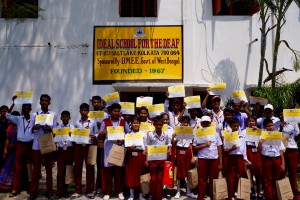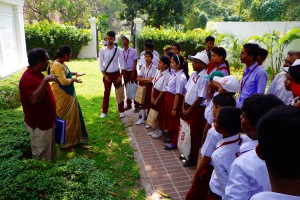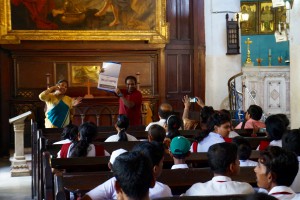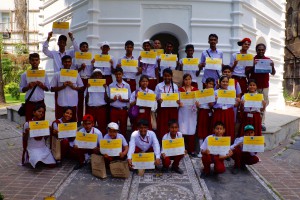GoUNESCO Make Heritage Fun – Calcutta, March 2017
INTRODUCTION
On 27th March 2017, Heritage Walk Calcutta, in collaboration with Made in Bengal and ArchaeologistsEngage, hosted the year’s first GoUNESCO Make Heritage Fun event in Kolkata, India. Make Heritage Fun is a global initiative by GoUNESCO, aimed at celebrating local culture—simultaneously, across the world. This campaign provides a platform for heritage and culture enthusiasts to share local heritage with others in their community. In Calcutta, we organized an event to help children with hearing-related disabilities explore Calcutta’s history through a guided and assisted 2-hour walking tour inside the compound of St. John’s Church, one of the oldest in the city. For this event, we were proud to work with the Ideal School for the Deaf, located in Salt Lake, Kolkata. 26 of their students from 6th to 10th grade (12-17 years old) and 6 teachers actively participated in this event. The tour was led by Tathagata Neogi, an archaeologist and the co-founder of Heritage Walk Calcutta, and translated into sign language by the accompanying teachers.
After the walking tour, we asked the children to create a work of art about what they learned during the walk. When ready, these paintings/sketches will be shared through our online platforms and displayed during an exhibition at the Ideal School for the Deaf later this year.
The following is a link to the live telecast at the beginning of the walk.
https://www.facebook.com/heritagewalkcal/videos/1473483729360771/
VISION
The accessibility of historic sites is an issue that has not been widely addressed globally. While some countries have recently passed legislation to ensure the accessibility of major historic sites for various groups with disabilities, this issue has not been systematically addressed in India, despite the country’s rich tangible and intangible heritage, and large population of people with disabilities. By conducting a heritage walk specifically aimed at children with hearing-related disabilities under the GoUNESCO Make Heritage Fun umbrella, we at Heritage Walk Calcutta wanted to start a discussion about the issue of accessibility in India’s historic sites. Heritage Walk Calcutta and our collaborators believe in a common, shared heritage, which members of disabled communities have an equal right to access.
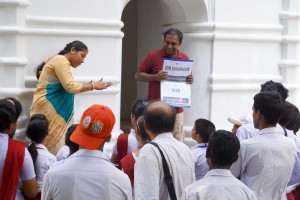
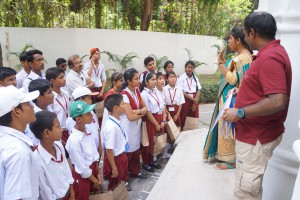 PREPARATION
PREPARATION
Heritage Walk Calcutta approached GoUNESCO about hosting this event under the Make Heritage Fun umbrella at the end of February. The original plan was to provide a bus tour of several major heritage sites for school children. When GoUNESCO approved our application to host an event, this idea was further refined in the hope of addressing accessibility issues in Indian heritage sites. At this time, our collaborators, Made in Bengal and ArchaeologistsEngage, came on board to provide support for the event. The idea of a bus tour was abandoned in favour of a walking tour to increase the experiential value of the event, and to give ample time for the children to connect with a single historic site in a deeper way.
The St. John’s Church complex was chosen as the venue because of its central location and historical importance as the first Anglican Cathedral of Calcutta. The church compound also houses the graves of Job Charnock, the “founder” of the city, and some other important East India Company personalities from the city’s very early days. The Church complex is also a protected site under the Archaeological Survey of India, which is a perfect setting to start discussions about the accessibility of heritage sites, and which does not have any restrictions on entry. Finally, since the children have hearing-related disabilities, the church compound provided safety from the fast moving traffic on some busiest streets in Kolkata, just outside the walls.
After this plan was finalized, we approached the Ideal School for the Deaf through a common friend. Their authorities were very enthusiastic about the event. We discussed our plan with the head of the institute and other faculty members to come up with an accessible narrative for the children. The school requested that the event be done on Monday, March 27th, rather than on Sunday, which was the day of the international event. GoUNESCO very kindly agreed to let us host the event on this alternate day to make it easier for the children to attend, since many of them come from very far distances to attend the school. The Friday before the event, Tathagata made a presentation at the school to give the children some historical context through pictures and paintings, with translation into sign language. This also provided us, the students, and the teachers with a warm-up run for the event.
To ensure the accessibility of the information during the walking tour, we prepared visual aids for the children. This included print outs of important names, dates and numbers in large fonts and visible colours. Tathagata also spoke slowly in Bangla so that the children, who are experts in lip-reading, could get some information immediately, without waiting for the translation. Both Tathagata and the teacher who was interpreting stood on higher ground whenever possible throughout the tour so that all of the children could easily see them. A small welcome kit was also provided for the children and their teachers, which included a bottle of water and some snacks.
FUTURE DIRECTIONS
The issue of the accessibility of historic sites is very close to our hearts at Heritage Walk Calcutta. We believe that, while one-off events like these can spark a discussion, this talk will die out if it is not regularly followed up by similar events and workshops. Heritage Walk Calcutta is therefore committed to making significant contributions to this discussion by organizing follow-up events for various disabled groups and by working with different stakeholders to make heritage sites more accessible for disabled communities.
Heritage Walk Calcutta is an academic-run company in Kolkata that aims to increase awareness of heritage in the community by connecting scholars and the common people through walking tours and workshops.
Tathagata Neogi is an archaeologist and the co-founder of Heritage Walk Calcutta.
OUR COLLABORATORS
The event would not be possible without the active support of our various collaborators and GoUNESCO. Here, I briefly introduce our collaborators and thank them for their support.
Ideal School for the Deaf: Established in 1967 by the Society for the Deaf, the school functions as a not for profit institution to provide free education for hearing impaired children. The organization is based out of Salt Lake Sector I, Kolkata, India. The school caters to students from all backgrounds in the Kolkata area and beyond.
Made in Bengal: ‘Made in Bengal.in’ is a digital platform for any product/service made by the people of Bengal..in Bengal…for the people of the world. The Made in Bengal team constantly work with artists, artisans and weavers to innovate in order to keep traditional techniques intact! The aim is to bring on more artists, manufacturers, designers, weavers, musicians, theatre artists, and so on, to this single e-platform and reach out to the world with our products, culture, art and cuisine.
ArchaeologistsEngage: ArchaeologistsEngage is an independent non-profit group of archaeologists who came together to enable engagement between professionals and the public. ArchaeologistsEngage is a registered voluntary organisation in the Norwegian Brønnøysund Register.

